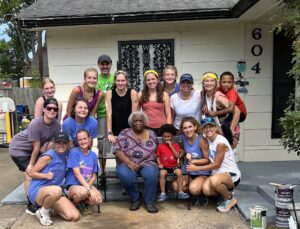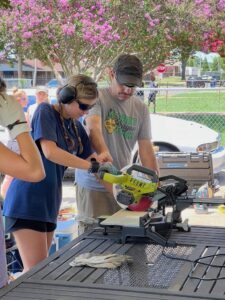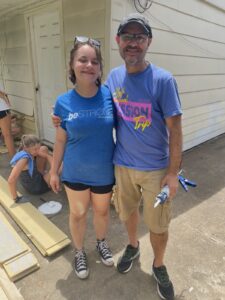Hands-on service: building healthier communities by improving housing quality and safety
August 3, 2023 • News

How do School of Public Health faculty, staff and students from the University of North Texas Health Science Center at Fort Worth spend their summers? Often, you will find them volunteering time in neighborhoods across the U.S., doing the hands-on work that builds healthier communities.
Numerous studies show that housing quality and safety is a key predictor of health and wellbeing. Our homes are the key to our health in many ways.
For HSC Regents Professor Dr. Scott Walters, his two teenage children and his father, it was a labor of love when they joined a weeklong mission trip to repair homes in West Memphis, Arkansas. The trip is an annual project organized by White’s Chapel Methodist Church and partnering organization Ozark Mission Project, which provides practical assistance to families needing home repair and yard work in Arkansas.
 Nearly 300 high school students, along with adult leaders, worked on 20 different homes in West Memphis and Marion, Arkansas, this summer. For over 20 years, the White’s Chapel High School Mission Trip has helped communities in New Orleans; Joplin, Missouri; Oklahoma City; Houston; Kansas City; Little Rock; and St Louis. Student volunteers outside the church can also be involved.
Nearly 300 high school students, along with adult leaders, worked on 20 different homes in West Memphis and Marion, Arkansas, this summer. For over 20 years, the White’s Chapel High School Mission Trip has helped communities in New Orleans; Joplin, Missouri; Oklahoma City; Houston; Kansas City; Little Rock; and St Louis. Student volunteers outside the church can also be involved.
White’s Chapel is active in a number of community projects, said Floyd Joseph, Co-Director of WC Students, to help expose teens to different types of mission work, from home repair and stocking food pantries to organizing summer programs for children and more.
“These experiences help students understand the value of serving others, and it helps broaden their view of community,” Dr. Walters said. “Students learn that no matter where we live, we can all use a hand from time to time.”
“It’s great to give money, but I think there is added value in sweat equity – actually doing the work yourself, especially for young people,” he said.
Dr. Walters’ 17-year-old daughter, Jocie, and 15-year-old son, Will, both feel they gained a lot from the experience.
 “For me it wasn’t just about the work, but also working with others and making new connections. The laughter and experiences brought us even closer. It was incredible to be able to connect with our host family and work alongside their children. Seeing everyone’s excitement made me proud to be part of the team,” Jocie said.
“For me it wasn’t just about the work, but also working with others and making new connections. The laughter and experiences brought us even closer. It was incredible to be able to connect with our host family and work alongside their children. Seeing everyone’s excitement made me proud to be part of the team,” Jocie said.
Will added, “The best thing for me was seeing how our workgroup became a tight-knit team. The leaders had to explain a lot on the first day, but by the end we were a well-oiled machine. Plus, I love that kind of deep sleep that comes after a day of hard work.”
Along with two other adult leaders, Dr. Walters helped guide a team of girls with replacing siding, roofing, painting and other home repair tasks.
“I was so impressed by this group of young people. You can really see them thrive in this setting. My favorite memory was showing them how to use a power tool then saying, ‘okay it’s your turn, cut the rest of this wood.’ They had such astonished looks on their faces,” he said.
Volunteers stayed in dorm rooms at the University of Memphis and were bussed to the project sites each day. In addition to workgroup leaders like Dr. Walters, the trip included a medical team; people to address support needs for the workgroups; and site coaches with experience in construction, who served as consultants for the projects.
“Transforming lives and helping to improve health and wellbeing are key components of public health as well as the church’s mission,” Dr. Walters said.
There is such added value, Dr. Walters noted, when public health works alongside faith-based and other nonprofit organizations to improve the quality of life in our communities through volunteer service and helping hands.

Social media